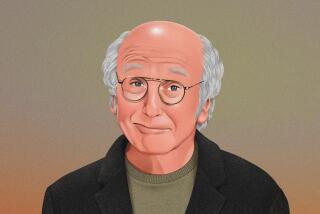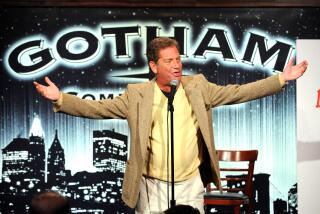Funny, Yes; Generation- Defining, No
- Share via
The buzz over “Seinfeld” is building.
Not just to pre-punctuate its May 14 finale with endless loud oom-pah-pahs and to worship reverently at the altar of the planet’s funniest comedy. But also to establish the immortality of Jerry, George, Elaine and Kramer, and celebrate their lasting imprint on humankind.
How lasting? “It defined an entire generation and changed television forever,” someone with a wild sense of humor was saying about “Seinfeld” on TV recently.
Come again? Someone needs to get a grip.
“Seinfeld” is indeed woven tightly into the fabric of pop culture and the profit structure of NBC, and its cast is so familiar and closely identified with the show that Jerry Seinfeld, Jason Alexander (George), Julia Louis-Dreyfus (Elaine) and Michael Richards (Kramer) can evoke laughter merely by walking onto a stage.
From teen to geriatric, their appeal is panoramic. Although the writing on “Seinfeld” has always been sophisticated, the 30 million or so who tune in every week, even during its last, least funny season, cannot all be young urbanites who relate to the weirdness of Manhattan. As I and my wife do, my mother, age 85, watches even every rerun. Maybe it’s the genes. And I know of an elderly man who watches the series religiously with fellow fanatics whose ages top out in the early 90s. “Seinfeld” is clearly a common denominator, a thread linking Americans. So all of those oom-pah-pahs are deserved.
Yet defining an entire generation? Changing TV irrevocably? Why not throw in curing cancer, too? Being wheezingly funny isn’t enough?
As surely as one yada follows another, this exaggerated, bloated “Seinfeld” anointing was inevitable as the series began winding down after an epic run on NBC that began July 5, 1989. Hyperbole was practically invented for eulogies. We spread it around when we crank each other into the ground, and do the same when we bury memorable TV series. And in this case, “Seinfeld” is already stratospheric in so many ways that it’s tempting to sail it a little higher by assigning it broad sociological implications.
But consider: Despite their cohesion and hilarity as bizarre comedy characters, Jerry, George, Elaine and Kramer are selfish, petulant, untrustworthy, thoughtless, infantile and superficial. So shallow that Jerry changes the “32” size to “31” on his jeans, and he once broke up with a girlfriend because she ate her peas one at a time. So shallow that Elaine once deemed a boyfriend worthy of her treasured contraceptive sponges only when he agreed to cut his sideburns. So shallow that on the new episode announced for Thursday, Jerry, George and Kramer visit a bookstore . . . only for the purpose of meeting women.
The enormous flaws of “Seinfeld” characters are precisely their allure. Their misbehavior at moral and ethical crossroads is predictable, their pettiness pathological. Jerry once mugged an old lady for a loaf of marble rye. And George is so callous that he could barely contain his glee when, after trying for so long to dump his fiancee, Susan, she died from licking their cheapie wedding invitation envelopes.
“Seinfeld” characters respond to everything viscerally. Their views of the universe and their personal relationships are driven by the same level of weightless trivia that they sit around and dissect endlessly.
They’re at once dependably self-absorbed and relentlessly undependable. They’re supposed to be close friends, yet unhesitatingly knife each other in the back for personal advantage. Family dysfunction is also a constant theme. George once even stole his father’s clothes, and once had sex in his parents’ bed, leaving behind a condom. Lower their grammar a few notches, and you can see this crowd with Jerry Springer.
*
Watch them, of course. Love them, of course. But do they define your generation? Anyone’s generation? Get serious. They don’t define mine.
And what about this business of “Seinfeld” shaping television?
Some series do that. On ABC, it was “Monday Night Football,” for example. On NBC, “The Tonight Show” and “Today,” and their many seedlings, have resonated across the decades. On Fox, “The Simpsons” refocused TV on prime-time animated series, initiating a contemporary trend that seems to be ever growing. And on CBS, “60 Minutes” has transformed much of television, not necessarily for the good, with prime time now awash with its magazine-show progeny that collectively have supplanted the traditional long-form documentary as a purported source of in-depth coverage on network TV.
But “Seinfeld”?
Although other comedies have sought to mimic and follow its path of savagely goofy schmoozing, these are small footprints on the landscape of TV.
Meanwhile, comedies about nothing have been populating TV nearly since its inception. Insignificance has always been the mother’s milk of sitcomdom, in fact. Although it never will be memorialized as scintillating, for example, “The Adventures of Ozzie and Harriet” beat “Seinfeld” to the Holy Grail of nothingness by about 37 years.
Watching the micro-lives of the Nelsons each week made your own life, however bland, seem vibrant and exciting in comparison. And from this prototype came the likes of “My Three Sons” and “The Brady Bunch,” all of which make “Seinfeld” and its own inspired nonsense seem almost meaty.
But meaty, shmeaty. “Seinfeld” doesn’t have to define a generation or change TV to be celebrated as the funniest comedy ever. And that is the only accolade that matters.
More to Read
The complete guide to home viewing
Get Screen Gab for everything about the TV shows and streaming movies everyone’s talking about.
You may occasionally receive promotional content from the Los Angeles Times.






